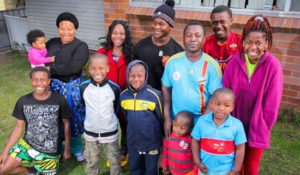Enduring the horrors of war and hunger – a refugee’s story
 At five years of age Clement Saidi’s father was killed by a lion.
At five years of age Clement Saidi’s father was killed by a lion.
The Congolese refugee’s father was a hunter and member of the pygmy tribe of the northern Congo and his loss left the family almost destitute.
Through the 1970s and 80s Clement’s family’s suffering was made worse by the interminable civil wars wracking the central African nation. He was shot, his wife raped and his family endured near starvation in a refugee camp.
Now living in Australia as a refugee, Clement has rebuilt his life and he hopes his children will have the opportunity-filled childhood he was denied.
“When I was just five years old my dad – who was a hunter – went out one day and never came back. People said he had been killed by a lion or a leopard,” he said.
“My mother was left on her own to raise us. She was a farmer and she worked hard to give us food and clothing but it was very difficult,” Clement said.
“Then one day she disappeared too. We don’t know what happened to her but there was fighting and she may have been killed,” he said
Clement was taken in and raised in a Catholic Church orphanage. He completed Year 12 in the orphanage and even bought a house and plot of land planning to settle down with his wife.
But the horrors of the string of conflicts that have beset the Congo since the 1960s eventually caught up with him.
He said that being a pygmy meant he was targeted with violence and discrimination.
“Being a pygmy is a dangerous thing because some opposition tribes believe that if they drink the blood of a pygmy it will make them more powerful, like a tonic, so that they would be victorious in their war. This meant that I was in constant danger of this horror,” Clement said.
His wife, a member of the Mbembey tribe, was also a target of the violence that beset central Africa in recent years.
She was abducted and abused over several days by a group of soldiers who came to the family’s house.
“They raped my wife and when I yelled out they put a bayonet to my head. I was bleeding and my wife was crying. Then they shot me in stomach. My wife lost her mind, it was a terrible experience,” Clement said.
After recovering in hospital, Clement and his wife and two children escaped to Tanzania.
But life in a refugee camp under the protection of the UNHCR was only marginally better.
“We lived there for 12 years and during that time my wife gave birth to five of our children,” Clement said.
“When food was delivered to the camp only those who had waited in line since dawn and were strong enough to fight to keep their place in line would receive a ration. At one food riot my son Munga’s elbow was dislocated,” he said.
“Sometimes no food would come for months and we had to rely on the kindness of our fellow refugees to keep us alive”, Clement said.
During the confusion caused by conflict in the Congo, Clement was also separated from his sisters. Occasionally he hears news of them but has never been able to locate them.
“People tell me they have seen my sisters and my mother and they are still in the Congo. And few times I went to look for them but I didn’t find them. I don’t know where they are,” he said.
Eventually the Government of Tanzania, the UNHCR and the Government of Australia agreed that Clement and his family would be granted humanitarian visas for Australia.
Clement and his family arrived in Australia in 2011 and were first located to Newcastle in New South Wales. The housing they were provided was substandard and Clement found it very challenging to find work.
It was very difficult for the family of twelve to survive, so they decided to relocate to Melbourne to find employment opportunities.
Clement eventually found casual on-call employment as a packer with Phresha Foods in Melton, where he now lives.
Phresa Foods was so impressed with Clement’s work that the company has offered him ongoing employment. He has become one of the most reliable employees at Phresha Foods.
Clement is so delighted to have ongoing employment and is thrilled he can support his wife and ten children, and to have finally found stability after many years of turbulence.
“I got this job because of the principle that I have always held. If something does not exist, you have to create it,” he said.
“We are grateful to be here in this country and I tell my children to respect Australia and to love Australia and Australians.
“My children are living a different life to me and I am glad they are safe and do not have to suffer as I did,” Clement said.
Annmarie Power
AMES Australia Staff Writer












